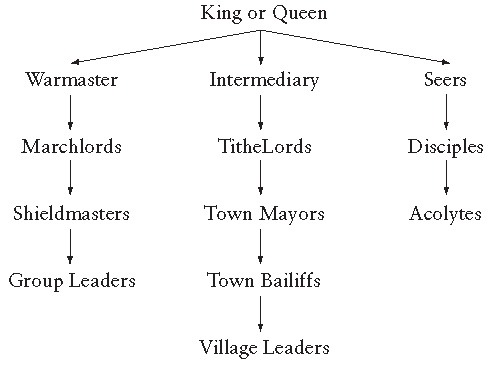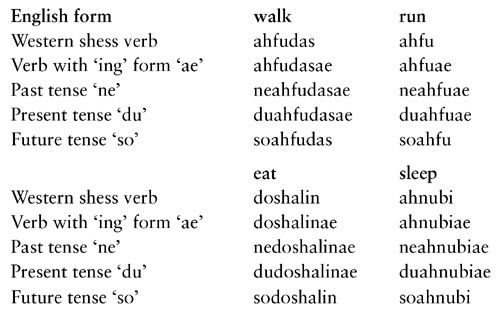Prisoner of Fate (43 page)
Authors: Tony Shillitoe

A BRIEF HISTORY OF WESTERN SHESS
The title of Shess for the vast western regions first appeared on cartographers’ documents during the seven-century reign of the Ashuak Empire, when Emperor Haarva began his expansionist crusade, and the Ashuak word ‘Shess’, meaning ‘foreign ones’, referred to a conglomerate of tribal factions with diverse cultures and languages. Despite disharmony and constant factional fighting between the many tribes, the great Ashuak armies failed to control the land they invaded. Instead, they learned that a disunited enemy was more troublesome than a united one because they were constantly harassed and confronted by new tribal groups who did not accept that the defeat of their neighbours also signified Ashuak rule over them. During the period of the Ashuak Empire, individuals sometimes tried to unite tribal groups against the common enemy. The concept of nationalism never superseded parochial tribalism, but the Ashuak principles of expansion and imperial rule took root, and after the Empire collapsed the strongest tribes in the north and west gradually dominated their neighbours to establish fledgling kingdoms.
Western Shess first took shape under the warrior chieftain Bigaxe Royal, a veteran of several battles with the Ashuak invaders. Bigaxe declared himself king of his region, demanding that his neighbouring tribal leaders recognise his sovereignty, and ruthlessly enforced his leadership over the many dissenters. Curiously, Bigaxe retained the Ashuak name for the region, probably because the only existent maps of the land were Ashuak in origin.
Royal successors settled their capital at Port of Joy and extended dominion further north and east during three centuries of Royal control, but rival kingdoms in the north in mountainous countryside eventually halted expansion. To the south, fierce tribal resistance, reminiscent of the war against the Ashuak invaders, stopped the kingdom from growing larger.
Although a patriarchal lineage, the death of King Godson Royal from illness shortly after the death of both his sons in battle left his only remaining child, his daughter Sunset, to succeed to the throne. Queen Sunset Royal defied numerous political manoeuvres to prevent her succession and assassination attempts once in power to successfully rule for twenty-seven years, before her son, Future Royal, began to fight for the throne, backed by religious rebels.
Religion is split between the ancient shamanistic forms with a multiplicity of spirits informing their followers, and the spreading monotheistic Jarudhaism imported from the eastern lands.
Jarudhaism is a corruption of the faiths originally started in the old eastern empires and kingdoms, a blend of Hohdaism and Jaru, along with some of the teachings of the philosopher Alwyn, called Alun in the
Shessian sect, as well as aspects of the shamanistic beliefs of the earlier Shess tribes. In its simplistic form, Jarudha is the one god who created the world and all of the people, and who has set down his laws for life through a series of great books collectively called
The Word. The Word
’s origins can be traced back to the Hohdan priests of the Ashuak Empire and a text called
Jaru’s Gift
that arose from earlier works written by Jaru philosophers, but subsequently
The Word
has been expanded to encompass at least fifteen known philosophical and religious works. Followers of Jarudha believe that Jarudha’s hand guides the affairs of the world, and that Jarudhan disciples only act according to His Will. They also believe that the world is corrupt and sinful, and that the time is approaching when Jarudha’s disciples will rise and assert dominion over the unfaithful who will be converted or destroyed.
In Western Shess, Jarudha’s disciples are synonymous with magical ability that is called the Blessing. Acolytes who demonstrate genuine magical skill are elevated to the rank of Seer, and the Seers believe that they are the vehicles for moral and spiritual consistency and reform. Jarudhaism is confined to the capital city, Port of Joy, and nearby towns. Outlying villages do not have Jarudhan representatives living in them.
The political structures are quite simplistic because of the tribal roots and brutal determination of Bigaxe Royal and his successors to keep control. Essentially the regent is the supreme authority and law, and the leadership beneath is militaristic. The religious leadership is the only exception, and tensions between the Royals and the Jarudhan disciples have been taut throughout the kingdom’s history.

The Royal influence as a physical presence seldom extends beyond ten days’ travel from Port of Joy, so many of the outlying farming districts and villages are not directly affected by the laws and edicts enforced in the city and close towns. Many of the distant villages are operated communally or in loose democratic ways, and taxes are paid, sometimes irregularly, as tithes to representatives of the local Tithe Lord.
The naming tradition has always centred on people being identified with their employment or place where they were born. Before the rise and fall of the Ashuak Empire, Shessian inhabitants had single names, but the Ashuak use of surnames was adopted and retained after the Empire collapsed. A woodcutter or butcher would be called Woodcutter or Butcher as the surname and then words commonly used in the trade were often used as first names. Hence there might be a family of three boys named Log, Crossgrain and Handsaw Woodcutter.
Children born into the Butcher family might be named according to cuts of meat or implements or even animals.
Surnames do not automatically identify related families. Farmer is a common surname, for example, and there would be unrelated Farmers in the same village and across the entire kingdom. Of course, descendants of a family of Sailors can move into other working industries, in which case someone named Hawser Sailor could well be the bartender in a local tavern, while Seam Clothmaker could be a farmer. Sometimes people also change their surnames when they change work. So Labourer Pullman, whose father was working on the wharves, could join the army and change his name to Labourer Onespear by choice. Western Shess has not yet conducted an official census or established a corporate identification system and so personal names are only useful for personal identity. Foreign names are evident in the cities and large towns, but the rural communities generally retain the traditional and simple name forms.
Shessian language has specific grammatical rules. A sentence is organised with the verb, the subject and then the predicate. Common usage has reduced many sentences to phrases best understood in expression than in straight translation.
The English sentence, ‘I am eating my food’ becomes approximately ‘Eating I am my food’—‘Doshalinae emahdu mahdu shali’—although its more accurate expression would be ‘Doshalinae emahdu’ (‘I’m eating’). In common usage, however, it is expressed as ‘Doshemah’.
Thus, ‘If you touch my wife, I will kill you’ becomes ‘Kill you I will, if touch my wife you do’—‘Sunahso yahwu emah, ha kaso mahdoos yahwu.’
Greeting is simple. ‘I’m pleased to meet you’ in formal form is ‘Jahn yahwu emahdu tessa’, but it’s common usage is a brief ‘Jahntess’, which serves as ‘hello’ does in English. The equivalent to ‘good day’ is ‘Jarubahn’, which originated from a very complicated ‘Umen emahdu ehae yahwu nena fueppo bahn t’Jarudha’, meaning ‘I am happy to see that God has given to you another day’.
‘I have planted the rain crop’ is expressed as ‘Nesoss emah epphanuhk’, and ‘Light the fire’ is ‘Ooh shah’, often expressed as a single word. The common soldier’s insult ‘Your mother fucks everyone!’ is ‘Hur yahwudo oyehn epyahn!’ although it’s generally expressed as ‘Hur epyahn!’
The language has developed some pleasantries, so that the English ‘please’ is expressed as ‘tessa’ at the completion of a sentence, as in ‘May I please speak to you?’ - ‘Casan emah yahwu, tessa?’, and ‘Excuse me’, becomes ‘Mahni mah’. But Shessian is an abrupt, focussed language in the main, and niceties are generally reserved for the royal courts.
Verbs are simplistically broken down into identified action, past (ne), present (du) and future (so) forms. For example:

English
/Shessian
afternoon
fulanbahn
air
hor
am
du
and
ut
another
fueppo
are
hi
army
eppodofahmah
big
jasu
by
t
chair
doahpin
crop
epphanuhk
cycle
ejas
day
bahn
death
doyanah
die
yanah
dying
doyanahae
early l
an
earth
dun
eat
doshalin
eight
bada
eighty-eight
mekbadabada
eleven
tata
evening
lanfubahn
excuse (verb)
mahni
farm
shukoh
father
doshoh
fifty-seven
mekdenja
fire
shah
first
tay
five
den
food
shahlin
four ay
fuck
hur
give
na
grain/seed
nuhk
happy
umen
home
dohahni
house
hahni
husband
doos
I
emah
if
ha
jump
naep
kill
sunah
late
fulan
less
enno
light
ooh
little
fujasu
man
dosh
many
ep
me
mah
meet
jahn
men
epdosh
midday
midbahn
middle/between
mid
midnight
midfubahn
mine/my
mahdo
moon
fubahnooh
more
eppo
morning
fujasubahn
mother
oyehn
night
fubahn
nine
lun
no/not
fu
one
ta
own/belong
do
plant
soss
please
tessa
rain
szash
rebel
nahsten
rebellion
dunahsten
run
ahfu
see/look
eh
seven
ja
sit
ahpin
six
net
sleep
ahnubi
soldier
dofahmah
speak/talk
casan
sun
horshah
ten
mek
thirty
mekest
thirty-three
mekestest
three
est
touch ka
twelve
ota
twenty
mekot
two
ot
unhappy/sad
fu-umen
walk
ahfudhas
war
fahmah
water
ar
wife
mahdoos
wine
chen
women
epyehn
woman
yehn
yes
hah
you
yahwu
your
yahwudo
- Army: usually a grouping of one hundred thousand soldiers, led by a Warmaster.
- March: a grouping of twenty thousand soldiers, led by a Marchlord; an army consists of five Marches.
- Shield: a grouping of one thousand soldiers, led by a Shieldmaster; a March consists of twenty Shields.
- Group: a grouping of fifty soldiers under the command of a Leader; a Shield consists of twenty Groups.
- Party: a grouping of ten soldiers; a Group contains five Parties.
Length measurement is a direct derivative of the human body. The smallest measuring unit is called a ‘width’, which is the original equivalent of an average person’s thumb width, although there is a standardised rule. Ten ‘widths’ makes a ‘hand’ length, and five ‘hands’ is the equivalent to an arm ‘length’. Thus for measuring purposes Shessian people talk of ‘widths’, ‘hands’ and ‘lengths’. They also link length measurements to travel distance measurements through ‘paces’ - the length of an average man’s stride when walking - with a ‘pace’ and a ‘length’ being accepted as an interchangeable measurement.